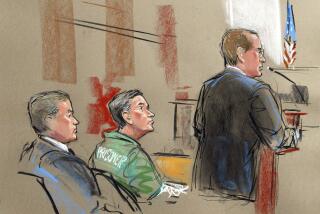Ames Says He Had No CIA Accomplices : Espionage: Convicted spy’s interrogation begins. Investigators are looking into agency shortcomings, lapses by its personnel.
- Share via
WASHINGTON — Convicted CIA spy Aldrich H. Ames, munching deli sandwiches and sipping coffee, reportedly told FBI and CIA officials questioning him for the first time Friday that he had no other accomplices and knew of no other moles inside the agency where he once worked.
While government sources would not reveal Ames’ initial insights, one intelligence official said that the questioning began with “a set of priorities that we’re working our way through. Obviously our first priority is: ‘Who else do you know about?’ ”
Ames reportedly denied working with anyone in the agency. Plato Cacheris, his defense attorney, said: “Ames will not disclose other high-level or low-level people because he doesn’t know of any.”
Despite that claim, one skeptical official said that “somebody must have inadvertently helped” the man responsible for the most damaging spy case in U.S. history. The official said investigators are determined to learn how Ames obtained more than 100 classified documents, many of them outside his jurisdiction.
During 31 years with the agency, Ames rose to become chief of Soviet counterintelligence in the CIA’s Soviet-East European division. But even after he was transferred to anti-narcotics work in the early 1990s, he continued to obtain Soviet-related CIA documents in apparent violation of the CIA’s “need-to-know” regulations.
Ames’ interrogation lasted more than five hours Friday in the first of what will be several months of debriefings in accordance with his court-approved plea agreement of a day earlier.
Arrested with his wife on Feb. 21, he was sentenced Thursday to life in prison without chance of parole after pleading guilty to betraying nearly a dozen Soviet officials who were cooperating with the CIA. He also gave the Soviets details of super-secret U.S. surveillance of the Eastern Bloc.
FBI spokesman Frank Scafidi said that two FBI officials are heading the interrogation team in a sparsely furnished government conference room. It is understood that CIA analysts also are involved in the questioning, in which Ames has agreed to be tested from time to time on a polygraph.
In coming days, as Ames is asked about specific documents and other information that he gave the Russians, including CIA operations he compromised, the agency will compile a confidential “damage assessment” report to determine what codes and other espionage techniques need to be altered, officials said.
One intelligence official said that Ames’ responses to their questions will send CIA analysts scurrying through their files to see if they can verify or disprove his answers.
“In some cases we might ask the Brits or other intelligence services about information that Ames provides or we might query our (CIA) stations overseas to check something out,” the official said.
Unless Ames fulfills his pledge of truthfulness and “full cooperation,” the government can withdraw its promise to recommend leniency for his wife, Rosario, when she appears for sentencing Aug. 26. Ames was motivated to enter into a plea agreement to spare his wife a long prison term while their 5-year-old son is being cared for by relatives.
Mrs. Ames pleaded guilty Thursday to the lesser espionage charge of “aiding, advising and encouraging” her husband’s spying. Both also admitted evading federal income taxes by concealing $2.5 million in cash payments from the Russians, more than twice the amount Moscow has given any previously known spy.
In addition to pointing up any flaws in CIA operations, the Ames case also could lead to discipline of CIA personnel who should have uncovered his actions earlier. A separate inquiry at the agency by CIA Inspector General Frederick Hitz is trying to determine why the agency failed for eight years to detect Ames’ spying.
CIA Director R. James Woolsey told a breakfast panel meeting of the American Bar Assn. that he intends to punish any CIA officials found to share blame for the lapse.
Woolsey also said that the CIA had limited Hitz’s inquiry before settlement of Ames’ criminal liabilities so that it would not interfere with his prosecution.
“I know there has been frustration in Congress--I certainly shared it, as have the employees of the CIA,” Woolsey said. But he added that the Justice Department had been correct in its concerns that the internal review would jeopardize prosecution of Ames and his wife.
Sen. Dennis DeConcini (D-Ariz.), chairman of the Senate Intelligence Committee, spoke Friday with Ames’ lawyer about having the convicted spy as a future witness on CIA reforms and budget matters. But officials said that nothing was resolved.
Mike Sheehy, an attorney for the House Intelligence Committee, said that the panel’s chairman, Rep. Dan Glickman (D-Kan.), also wants to explore the idea but that they realize Ames “will be quite busy for awhile talking to FBI and CIA investigators.”
More to Read
Sign up for Essential California
The most important California stories and recommendations in your inbox every morning.
You may occasionally receive promotional content from the Los Angeles Times.








